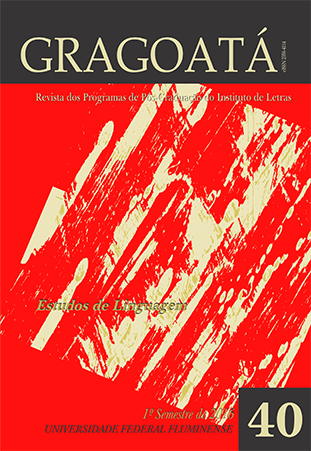A COMPUTATIONAL EFFICIENCY PRINCIPLE IN ACTION IN THE PROCESSING OF RECURSIVELY EMBEDDED PPS IN BRAZILIAN PORTUGUESE AND IN KARAJÁ
DOI:
https://doi.org/10.22409/gragoata.v21i40.33379Palavras-chave:
Recursividade, eficiência computacional, Português brasileiro, KarajáResumo
This paper presents and discusses two eye-tracking experiments comparing the processing of coordination and embedding of Prepositional Phrases in Brazilian Portuguese (BP) and of Postpositional Phrases in Karajá. Experiment 1 compares the processing of sentences containing Prepositional Phrases which may be self-embedded or conjoined in Brazilian Portuguese. Experiment 2 compares the processing of sentences containing Postpositional Phrases which may be self-embedded or conjoined in Karajá. 20 Brazilian Portuguese (BP) and 20 Karajá subjects had their eye movements monitored as they performed a sentence/picture matching task including sentences in BP and in Karajá, respectively. Based on previous studies reported in Maia et al (to appear), two hypotheses were formulated, both for BP and Karajá, namely, (i) launching the self- embedding of PPs would be more costly to process than launching the conjoining of PPs; (ii) after launching, the subsequent self-embedding of a third PP would be less costly than the previous PP. Results confirmed these predictions and are analyzed in terms of a third factor computational effect learning algorithm.
------------------------------------------------------------------------------
UM PRINCÍPIO DE EFICIÊNCIA COMPUTACIONAL EM AÇÃO NO PROCESSAMENTO DE SPS ENCAIXADOS E COORDENADOS EM PORTUGUÊS BRASILEIRO E EM KARAJÁ
Este artigo apresenta e discute dois experimentos psicolinguísticos de rastreamento ocular comparando o processamento da coordenação e do encaixe de Sintagmas Preposicionais (SP), em Português Brasileiro (PB) e de Sintagmas Posposicionais (SP) em Karajá. O experimento 1 comparou o processamento de frases contendo Sintagmas Preposicionais que podem estar coordenados ou encaixados recursivamente em Português do Brasil. O experimento 2 comparou o processamento de Sintagmas Posposicionais que poderiam estar recursivamente encaixados ou coordenados em Karajá. 20 sujeitos falantes de Português Brasileiro (PB) e 20 sujeitos falantes de Karajá tiveram seus movimentos oculares monitorados enquanto realizavam uma tarefa de julgamento de correspondência entre frase e imagem. Com base em estudos anteriores relatados em Maia et alii (a aparecer), duas hipóteses foram formuladas, tanto para o BP quanto para o Karajá, a saber, (i) o lançamento do processo de encaixe de SPs seria mais caro para processar do que o lançamento do processo de coordenação de SPs; (ii) após o lançamento, o terceiro SP seria menos custoso do que o SP anterior. Os resultados confirmaram essas previsões e são analisados em termos de um algoritmo de aprendizagem, funcionando como um efeito computacional de terceiro fator.
---
Artigo em inglês.
Downloads
Downloads
Publicado
Como Citar
Edição
Seção
Licença
AUTORIZAÇÃO
Autores que publicam em Gragoatá concordam com os seguintes termos:
Os autores mantêm os direitos e cedem à revista o direito à primeira publicação, simultaneamente submetido a uma licença Creative Commons Atribuição 4.0 Internacional (CC BY 4.0), que permite o compartilhamento por terceiros com a devida menção ao autor e à primeira publicação pela Gragoatá.
Os autores podem entrar em acordos contratuais adicionais e separados para a distribuição não exclusiva da versão publicada da obra (por exemplo, postá-la em um repositório institucional ou publicá-la em um livro), com o reconhecimento de sua publicação inicial na Gragoatá.
A Gragoatá utiliza uma Licença Creative Commons - Atribuição CC BY 4.0 Internacional.














